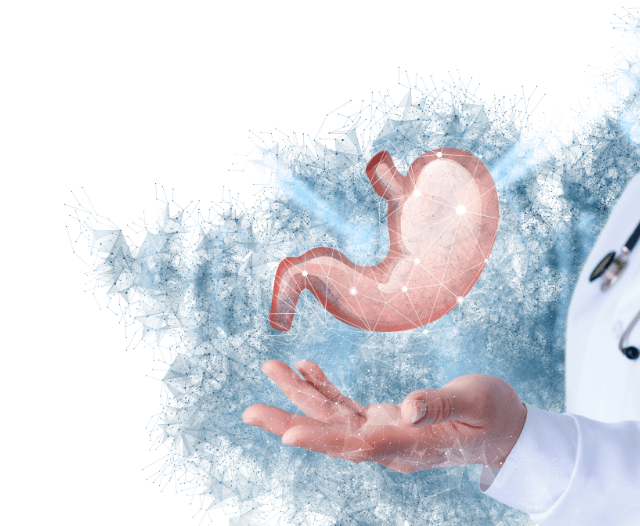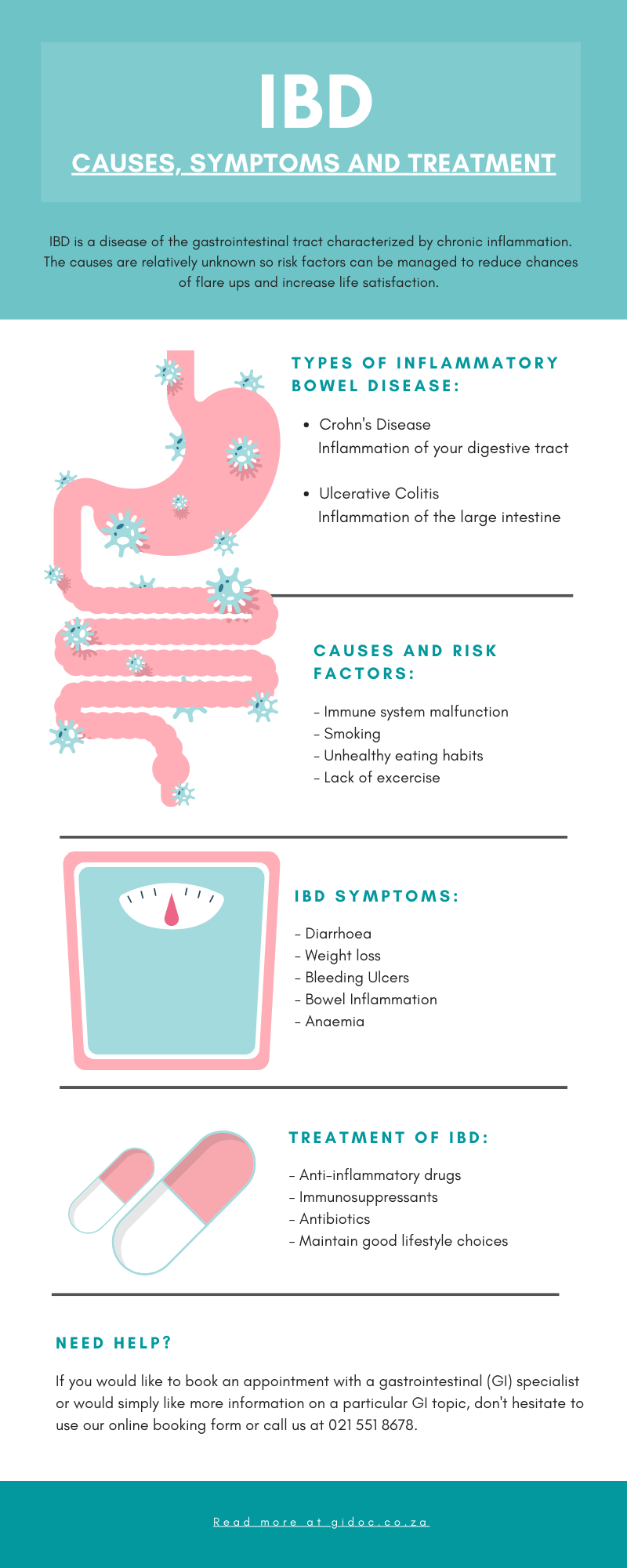IBD is a disease of the gastrointestinal tract characterized by chronic inflammation. The causes are relatively unknown so risk factors can be managed to reduce chances of flare ups and increase life satisfaction.
Here we look at the causes, typical symptoms, and possible treatments.
Overview
Inflammatory bowel disease is referred to as an umbrella term which is used to describe disorders that involve chronic inflammation of the digestive tract.
In other words, inflammation that remains for a long period of time with periods of flare ups interlaced with periods of remission.
The digestive tract comprises the mouth, oesophagus, stomach, small intestine, and large intestine. It’s responsible for breaking down your food, extracting the nutrients, and getting rid of waste material.
In times gone by, IBD has been thought to be a type of autoimmune disease but, as more research is published, there are suggestions that the chronic inflammation is not due to an attack on your body by your immune system.
Rather, the inflammation is believed to be caused by one’s immune system attacking bacteria or food in the gut which then leads to inflammation.
In the article, we’re going to explore IBD in terms of its causes, symptoms and treatments for a better overall understanding of the disease.
The Different Types of Inflammatory Bowel Disease
Before we jump into the causes, symptoms, and treatment of IBD, it’s first important to state and understand the two main categories of IBD.
IBD is split into two main categories: ulcerative colitis and Crohn’s disease.
Ulcerative colitis involves inflammation of the large intestine with inflammation only present in the innermost layer of the lining of the colon.
Apart from inflammation, ulcerative colitis can also present as sores, or ulcers, on the colon lining. Another characteristic of this form of IBD is that the damaged areas are continuous.
This is in contrast to how Crohn’s disease presents.
Whereas ulcerative colitis is limited to the large intestine, Crohn’s disease can involve any part of the gastrointestinal tract from the mouth all the way to the end – the anus.
Most commonly, it develops in the final part of the small intestine and colon. Another differentiating factor is that it occurs in distinct patches.
Unlike the continuous inflammation found in ulcerative colitis patients, those suffering from Crohn’s disease present with quite distinct healthy and inflamed areas of tissue.
Crohn’s disease seems to be increasing in occurrence with time – studies in the United States suggest that over half a million people are suffering from the disease.
The distinction between the two forms of IBD is not always crystal clear.
When a doctor is unable to determine whether a patient has ulcerative colitis or Crohn’s disease, they will classify the patient’s condition as “indeterminate colitis” implying that there are cases where it’s not always clear one way or the other.
This is a good place to have a momentary aside and talk about irritable bowel syndrome and compare it with irritable bowel disease.
Many similarities between the two can make it more difficult to tell them apart.
For one, they both lead to changes in bowel habits accompanied with pain in the abdomen.
In terms of symptom occurrence, it can flare-up for short periods where there is a lot more physical discomfort and suffering followed by longer periods of remission.
Causes and Risk Factors for Inflammatory Bowel Disease
The exact cause of inflammatory bowel disease is unknown and, taking the extreme complexity of the gut and its microbiome, this fact isn’t all that surprising.
One cause that might be likely is one of immune system malfunction. In this case, your immune system targets and attacks cells in the digestive tract which has an inflammatory side-effect.
The fact that the exact cause is unknown warrants a closer look at known risk factors.
As the saying goes – “prevention is better than cure”.
There are some lifestyle choices which can significantly lower your risk of developing irritable bowel disease.
Age-old advice goes a long way here: Eat healthy foods and exercise regularly.
In terms of risk factors, one of the main culprits is smoking.
Smoking, in general, is a terrible thing for the body which affects almost every part of your living system. In terms of IBD, smoking is one of the chief risk factors for developing Crohn’s disease.
Apart from increasing your risk, smoking increases the pain patients which experience when they already have Crohn’s disease and it results in a higher chance of complications.
Age is less of a risk factor than with other diseases with most cases of IBD presenting before a patient is thirty-five years old. Gender also does not play much part here with both males and females generally being affected equally by IBD.
Your geographical region (where you live) plays a predicted role in determining whether you will develop IBD or not. Those living in urbanized areas have a higher chance of getting IBD which can somewhat be explained by lifestyle choices and a diet consisting of more fat and processed food.
Alright, so we’ve established some of the risk factors. Now it’s time to look into possible treatments available.
Inflammatory Bowel Disease Symptoms
Naturally, the symptoms of IBD vary according to the location of the disease, its severity and the type. As mentioned earlier, symptom onset can flare-up more intensely, with variations of course, and then settle down into remission for a longer period.
While inflammation is the main concern with IBD, it can be difficult to realize that it’s a problem. For that, we need to look at other symptoms that can occur in the body such as the following:
- Diarrhoea which occurs due to the inflamed part of the bowel being unable to reabsorb water thus leaving an excess that the body must rid itself of.
- Weight loss and anaemia as a result of the poor reabsorption of nutrients, patients can experience a loss in weight which can cause delayed developmental growth in children.
- Bleeding ulcers are another indicating symptom which can cause blood to show up in the stool.
- Bowel inflammation and obstruction also result in stomach pain, cramping, and bloating.
Apart from these, IBD has been associated with issues outside of the digestive system such as eye inflammation, skin disorders, and arthritis.
Treatment for Inflammatory Bowel Disease
Due to the inflammation being the main problem in IBD with cascading effects, anti-inflammatory drugs are the first step in an IBD treatment plan.
Apart from reducing inflammation, it’s important to lower the immune response in an attempt to stop the immune system from attacking the bowel which causes inflammation. Immunosuppressants are administered for this.
There are risks of side-effects so doctor consultation is important to establish the right medication on a case-by-case basis.
Antibiotics can also be administered to target bacteria that may be triggering or worsening IBD symptoms.
Once the main symptoms have been dealt with, it’s important to maintain good lifestyle choices to further reduce symptoms and risk of re-onset.
This includes addressing the loss of fluid by drinking plenty of water and avoiding potential bowel irritants such as dairy products.
In some cases, surgery can be necessary.
For people with Crohn’s disease, surgery can be a means used to remove affected parts of the intestine while severe cases of ulcerative colitis may require the removal of the entire colon and rectum.
What’s Next?
If you would like to book an appointment with a gastrointestinal (GI) specialist or would simply like more information on a particular GI topic, don’t hesitate to use our online booking form or call us at 021 551 8678.
We’re always happy to help you understand the oftentimes confusing world of the gut and its relation to our overall health.
DISCLAIMER: PLEASE READ CAREFULLY
The information on this website is to provide general guidance. In no way does any of the information provided reflect definitive medical advice and self-diagnoses should not be made based on information obtained online. It is important to consult a Gastroenterologist or medical doctor regarding ANY and ALL symptoms or signs including, but not limited to: abdominal pain, haemorrhoids or anal / rectal bleeding as it may a sign of a serious illness or condition. A thorough consultation and examination should ALWAYS be performed for an accurate diagnosis and treatment plan. Be sure to call a physician or call our office today and schedule a consultation.
© Dr. Eduan Deetlefs, Registered Gastroenterologist, GI Doc Cape Town
Our website information is not intended or implied to be a substitute for professional medical advice, diagnosis or treatment. Please consult a doctor about your specific condition. Only a trained physician can determine an accurate diagnosis and proper treatment.







